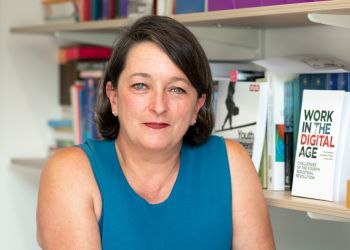
A major new research centre exploring how digital technologies are changing the world of work is to launch at the start of 2020.
The Digital Futures at Work Research Centre (Digit Centre) will operate from the business schools of the universities of Sussex and Leeds and aim to provide a compelling empirical base for policy makers beyond current levels of speculation as to the impact of new technologies on jobs and workers.
The centre, which includes Eversheds Sutherland, Marks and Spencer, Ernst and Young, Walmart US and the Department of Work and Pensions among its knowledge exchange partners and advisory board members, has secured £8 million in Economic and Social Research Council (ESRC) funding over a five year period.
Centre co-director Jacqueline O'Reilly, Professor of Comparative Human Resource Management at the University of Sussex Business School, said: "We know that some firms are at the forefront of digital transformations, whilst others are lagging behind. We know that we have some of the best qualified STEM graduates in the UK, while other lack basic digital skills. And we know that countries vary in their ability to effectively take up some of these challenges.
"But we don't always know why these gaps are appearing and what can be done to ensure that digital transformation is inclusive. The Digital Futures at Work Research Centre will have some of these questions at the heart of its investigations to understand not only what is happening in the UK, how this compares internationally, and what needs to be done."
The centre, which will officially launch on January 1, is one of four recipients of £25 million of ESRC funding around the UK announced today.
The new centre will aspire to ensure all workers have opportunities for a fulfilling and meaningful career.
In particular its objectives include:
• Generate new knowledge to inform the development of an analytical framework around the concept of the 'connected worker' and the 'connected economy' by maximising knowledge exchange and co-produced research with relevant communities.
• Establish a new Data Observatory as a one-platform library of national and international resources for decision-makers connecting with UK Industrial Strategy and welfare policy.
• Initiate a £500,000 Innovation Fund providing financial support for new research initiatives and methodological approaches, enabling international exchanges and extensive dissemination.
• Provide a strong career development programme for mid and early career researchers through mentoring and staff development, internships and summer schools.
• Ensure the long-term sustainability of the centre by developing an MSc in People Analytics informed by Digit research.
Centre co-director Mark Stuart, Montague Burton Professor of Human Resource Management and Employment Relations at Leeds University Business School, said: "The impact of new technologies on the future of work is one of the most pressing policy concerns of our time. Yet debate is largely speculative. Over the next five years, the Digital Futures at Work Research Centre will embark on an agenda setting programme of research that will provide compelling evidence on the contemporary transformation of work.
"The centre will act as a focal point for all those interested in the future of work, providing a much needed space to bring together academic researchers, policy makers and practitioners to interrogate contemporary developments within an historical, international and comparative perspective."
Additional partners in the centre include:
Professor Claire Wallace at the New Europe Centre, University of Aberdeen
Professor Simon Deakin director of the Centre for Business Research at the University of Cambridge
Dr Brendan Burchell at the University of Cambridge
Prof Jill Rubery and Prof Debra Howcroft from the Work and Equalities Institute at the Alliance Manchester Business School.
Prof Fang Lee Cooke at the Faculty of Business and Economics at Monash University, Australia.






